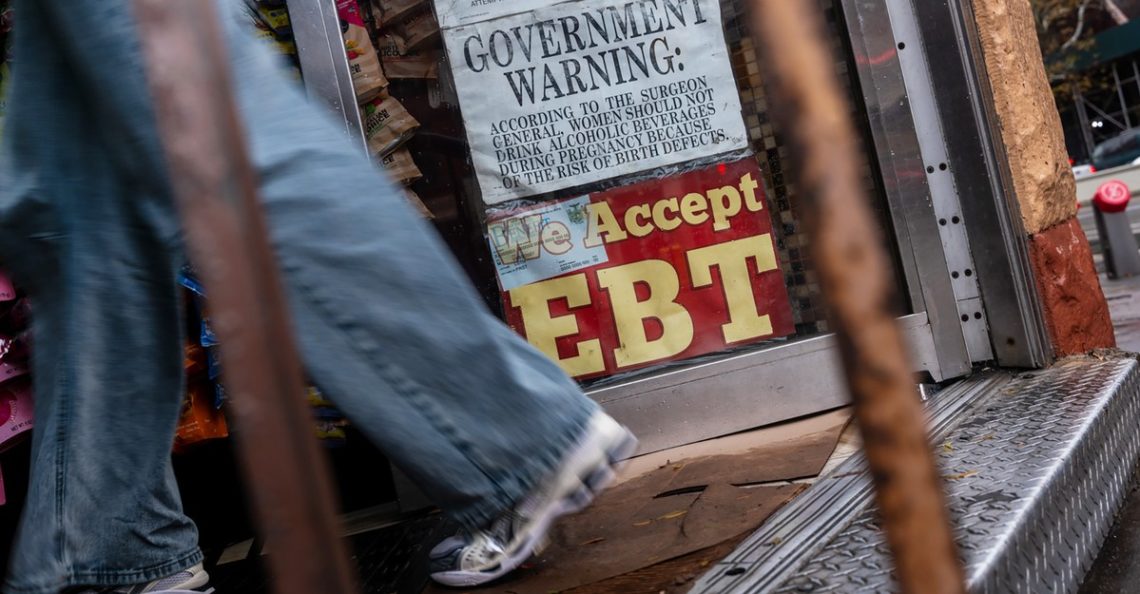Millions of the poorest Americans are stuck in food-stamp limbo. They still do not know when their benefits will arrive—or if they will at all.
In the past few days, the government shutdown has thrown the food-stamp program, formally known as SNAP, into chaos. On Friday, after the Trump administration said that SNAP was on the verge of running out of money, a federal judge ordered the White House to tap into a reserve of funds and pay out billions of dollars in benefits. Then, yesterday, the administration said that it had only the funds to provide people on food stamps with half of their monthly allotment of benefits. To make matters even more confusing, President Donald Trump today appeared to contradict his own Justice Department: SNAP benefits, he posted on Truth Social, “will be given only when the Radical Left Democrats open up government.”
White House Press Secretary Karoline Leavitt later appeared to walk back the president’s post. The administration is “fully complying” with the court order, she said. (When reached for comment, the White House pointed me back to Leavitt’s press briefing.) If the administration makes good on its promise, Americans still might not get their benefits for quite some time. In a legal filing, the administration said that it may take some states several months—yes, months—to get the benefits released, despite the fact that the judge ordered the benefits to be released by tomorrow.
None of this is normal. Food-stamp benefits have never been cut like this in the current program’s more-than-60-year history. “It is a significant inflection point in the program’s history,” Christopher Bosso, a political scientist at Northeastern University who wrote a book on SNAP, told me. “Where we go from here is anyone’s guess.”
This dustup likely means that some of the nation’s most vulnerable will end up going hungry, at least temporarily. In 2023, 5 percent of U.S. households qualified as very food insecure, meaning that at least one household member’s “normal eating patterns” were disrupted because of a lack of food. Even in cases where there isn’t a risk of immediate hunger, the delay in getting food-stamp money will create stress for Americans who rely on the program. SNAP provides low-income Americans with a monthly stipend loaded onto prepaid cards that they can use to buy groceries, and government data on SNAP transactions show that roughly 40 percent of households have less than $1 left at the end of the month.
These are signs that once the funds are released—assuming they are—many Americans will still struggle to make due on half of their usual food-stamp budget. The average SNAP household with children receives $574 a month, meaning that they will now receive less than $300 in food stamps for the entire month. The Department of Agriculture, meanwhile, estimates that it costs nearly $1,000 a month to feed a family of four a “nutritious, practical, cost-effective diet.” In such a situation, SNAP beneficiaries are likely to gravitate toward the cheapest, most calorie-dense foods they can find.
Facing hunger, “your body is hardwired to go find food, whatever food you can find, regardless of whether it’s nutritious and regardless of whether it’s safe,” Hilary Seligman, a professor at UC San Francisco who researches food insecurity, told me. In the era before food stamps, that meant making decisions that now seem unconscionable: A 1954 survey of pregnant Black women in Louisiana found that 38 percent were eating laundry starch to satiate their hunger; 25 percent reported eating clay. In present-day America, the poor are likely to turn to ultra-processed foods. Packaged snacks full of industrial additives are ubiquitous and cheap: A bunch of kale is much more perishable than a bag of Doritos. An artisanal loaf of bread will set you back more than Wonder Bread. At my local grocery store, a pound of ground beef costs nearly $8, but a frozen entrée of six Salisbury steaks with gravy can be purchased for just $5. Ultra-processed foods cost just 55 cents per 100 calories, compared with $1.45 for unprocessed foods, according to a recent study.
These same ultra-processed foods have been targeted by the Trump administration and particularly by Robert F. Kennedy Jr., the secretary of Health and Human Services. He has pointed to junk food as a major contributor to America’s chronic-disease problem and has declared emphatically that food-stamp recipients should not be able to use government funds to buy soda. Several states will be testing a ban on the purchase of soft drinks and other sugary foods with food stamps starting next year.
The reasons ultra-processed foods are so troublesome are also the reasons they may, in this situation, provide a lifeline until SNAP benefits are fully restored. Yes, soft drinks might not do much to help a family stave off hunger, but faced with all of this uncertainty about if and when their benefits will come, SNAP households are going to be stocking up on the cheapest food they can rely on, even if they know it’s unhealthy. Now more than ever, healthy foods are a luxury in the United States.
The post The Food-Stamp Crisis Could Last Months appeared first on The Atlantic.




